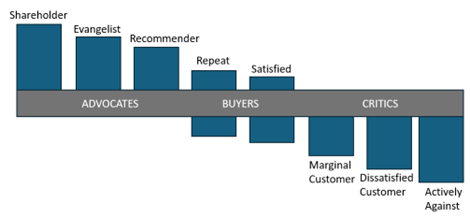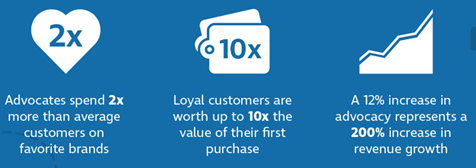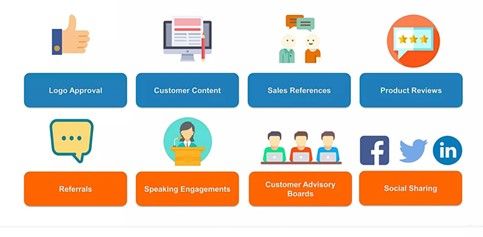Developing a CA Score to Identify Your Best Customer Advocates
Jonathan Lee
ISSI Customer Success Practice Lead

Developing a CA Score to Identify Your Best Customer Advocates
Note: This is #7 in the Customer Advocacy Success Practice Blog Series by Jonathan Lee. To read other articles in the series, go to the ISSI Knowledge Bank.
Many organizations use a Customer Satisfaction or Net Promoter Score (NPS) to measure customer satisfaction. While this is a good way to understand their satisfaction level, it usually does not result in significant tangible returns to the organization, such as customers providing a reference site or testimonial.
Perhaps it is time to consider a more innovative and structured way to get the most out of loyal customers. It's what I call the Customer Advocacy Way.
This blog will cover what the Customer Advocacy Way is, who Customer Advocates are and how to identify them, what contributions they can make, and how to measure their value to your organization by developing a Customer Advocacy (CA) score.
What is Customer Advocacy
First, let's examine the term "Customer Advocacy." Here is a good definition:
"Customer advocacy is the act of building and nurturing relationships with loyal customers, who then act as spokespeople and champions for your brand, products, or services. This process starts by identifying who those loyal customers are. To pinpoint your customer advocates, look for happy customers who frequently use your products or services in innovative ways and see a big impact on their business as a result." 1
Customer Advocacy is a way to identify loyal customers-or Customer Advocates-and actively engage them. But who are these Customer Advocates? They are
"Highly-satisfied customers who share information about the products and services they use without any incentive to do so. Their action influences the opinions and purchase decisions of a large audience." 2
The diagram below from Deloitte provides a clear visual representation of Advocates vs. Buyers vs. Critics.

Why is Customer Advocacy important?
As seen from the diagram above, Customer Advocates are more than just repeat buyers. They are "strong customers" as they usually buy more, make recommendations, are more likely to share favourable reviews, influence purchase decisions, provide testimonials, act as reference sites, and even refer and evangelize your products/company. 2

How to Identify Customer Advocates
Now that we understand the importance of Customer Advocates, how do we identify them? This can be done in two ways:
- Objective data - Revenue contribution (annual recurring revenue, total revenue, number of workloads, etc.), margin analysis, customer sentiment (Customer Satisfaction rating, NPS rating), Customer Health Score rating (Green in all metrics), etc.
- Subjective input - Feedback from the management team, account team, CSM, engagement level with the sponsor and key stakeholders, etc.
What Contributions Can Customer Advocates Make?
The diagram below shows various forms of Customer Advocacy 3. They range from a simple logo approval for a reference site to a more complex referral, speaking engagement, or customer advisory board.
Each of these activities is immensely beneficial to the seller organization.

Measuring the Effectiveness of Customer Advocacy with a CA score
As mentioned in the previous section above, there are several ways that a Customer Advocate can contribute to the seller organization. Each of these activities can be tracked. For example, who among the advocates has consented to using their logo in a reference site, who wrote a testimonial, or who participated in an event as a guest speaker?
However, organizations usually lack a structured and organized way to consolidate all these CA contributions, apply a weightage, and rank each of the advocates.
Perhaps it is time to create a "Customer Advocacy Score" to clearly define the level of contribution from each of the advocates, put a weightage based on the relative importance of the activity, and then combine them to have a consolidated score.
The example table below shows how an overall CA score can be computed.

This table and total score can help the seller organization clearly understand who has contributed, what they have contributed, and how additional engagement can derive more benefits from these advocates.
How is Customer Advocacy Related to Customer Success?
The Customer Success organization is perhaps the best team to execute Customer Advocacy activities. A Customer Success Manager acts as a "Trusted Advisor" to the customer, has an intimate relationship with them, and has great insights into their environment and how the customer has gained business outcomes from using the solution. Many of these customers will be willing advocates once the trusted relationship has been established.
In fact, as the Customer Success team matures, they should start measuring Customer Advocacy beyond just customer satisfaction/NPS, renewal and expansion (upsell/cross-sell).
Conclusion
Customer Advocacy is a next-level measurement of customer engagement that goes beyond basic customer satisfaction metrics or a Net Promotor Score. Identifying Customer Advocates and engaging them in order to increase their participation will help the seller organization achieve better returns.
The Customer Advocacy score is a structured way to establish a baseline for their contribution while providing a basis for the seller organization to strategize their engagement with their Customer Advocate.
To learn more about this topic and how you can execute a Customer Advocacy program, contact us at sales@issi-inc.com
About the Author
Jonathan WM Lee is the ISSI Customer Success Practice Lead. He holds the following certifications: Prosci Certified Change Management, Cisco Customer Success Manager, Microsoft Services Adoption Specialist, Certified Customer Success Manager Level 1 & 2 (SuccessHacker), and ISO 27001 Lead Auditor. He has extensive experience with over 100 engagements in training, consulting, and auditing of Customer Success programs, processes, and tools. He is also the co-author of the Cisco Advanced Customer Experience Specialization Checklist and Juniper Networks Business Model Transformation Blueprint/Playbook. He previously spoke in the ISSI-TSIA webinar on "Identifying Strengths & Gaps of your CS Practice."
1 Zendesk blog, 23 May 2022 - https://www.zendesk.com/sg/blog/customer-advocates-secret-ingredient-sales-support-success/
2 Jitbit, 10 Aug 2020 - https://www.jitbit.com/news/customer-advocacy/
3 Gainsight - Creating a Global Customer Advocacy program - https://www.slideshare.net/slideshow/creating-a-global-customer-advocacy-program/65828190
Additional Articles
You need to assess your customer success practice readiness. Here is why & how.
Jonathan Lee, ISSI Customer Success Practice LeadYou need to assess your Customer Success practice readiness. Here is why & how. By Jonathan Lee – ISSI Customer Success Practice Lead Customer Success
Microsoft's AI Cloud Partner Program: A New Way to Empower Partners
Pablo Marrone, ISSI Senior ConsultantThese start with the most basic - Membership - which is open to all channel partners. From there they progress through partner success; the attainment of “designations” based on partner capability scores; and finally, “specializations” that
Building a solid strategy for becoming a cloud managed service provider
Barry Turner, ISSI Head of Global Marketing & Senior ConsultantCloud Management Platforms: A Core Component in Growing Your Managed Services Business By Amarnath Gutta, Senior Consultant, ISSI In our work with partners through workshops,
- 17 APR 2025
The Growing Importance of Certified AI Managers
Lazar Kaluderovic, Senior Consultant, ISSICertified AI managers play a crucial role in this environment by integrating artificial intelligence into business operations. Their roles extend well beyond the basic implementation of AI-driven solutions, with responsibilities that include ensuring alignment with legal frameworks, assessing and mitigating risks, and fostering trust in AI systems.
19 OCT 20223 signs it’s time your company establish a Cloud Center of Excellence
Florence Tadjer and David Pool, ISSI Senior Consultants3 Signs It’s Time Your Company Establish a Cloud Center of Excellence By Florence Tadjer and David Pool, ISSI Senior Consultants A Cloud Center of
15 DEC 2023Monetization in customer success – Reality or Myth
Jonathan Lee, ISSI Customer Success Practice LeadMonetization in Customer Success – Reality or Myth By Jonathan Lee – ISSI Customer Success Practice Lead Customer Success Practice Blog Series #6 In my
